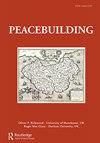Peacebuilding paradigms: the impact of theoretical diversity on implementing sustainable peace
IF 1.4
3区 社会学
Q2 INTERNATIONAL RELATIONS
引用次数: 1
Abstract
Peacebuilding Paradigms analyzes how seven political science paradigms: realism, liberalism, constructivism, cosmopolitanism, critical theories, locality and policy, have been used to interpret the causes and consequences of peacebuilding differently. The contributors explore the arguments of each paradigm, and then compare and contrast them. This book suggests that a hybrid approach that incorporates useful insights from each of these paradigms best explains how and why peacebuilding projects and policies succeed in some cases, fail in others, and provide lessons learned. Rather than merely using a theoretical approach, the authors use case studies to demonstrate why a focus on just one paradigm alone as an explanatory model is insufficient. This collection explains how peacebuilding theory affects peacebuilding policies and provides recommendations for best practices for future peacebuilding missions.建设和平模式:理论多样性对实现可持续和平的影响
《建设和平范式》分析了现实主义、自由主义、建构主义、世界主义、批判理论、地方和政策等七种政治科学范式如何被用来不同地解释建设和平的原因和后果。作者探讨了每个范式的论点,然后对它们进行比较和对比。本书认为,结合这些范例的有用见解的混合方法最好地解释了建设和平项目和政策如何以及为什么在某些情况下成功,在其他情况下失败,并提供了经验教训。作者不是仅仅使用理论方法,而是使用案例研究来证明为什么只关注一种范式作为解释模型是不够的。本汇编解释了建设和平理论如何影响建设和平政策,并为今后的建设和平特派团提供了最佳做法建议。
本文章由计算机程序翻译,如有差异,请以英文原文为准。
求助全文
约1分钟内获得全文
求助全文

 求助内容:
求助内容: 应助结果提醒方式:
应助结果提醒方式:


